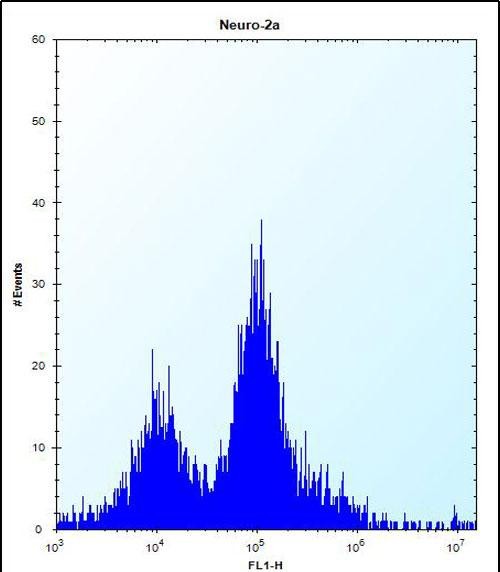


| WB | 1/1000 | Human,Mouse,Rat |
| IF | 咨询技术 | Human,Mouse,Rat |
| IHC | 咨询技术 | Human,Mouse,Rat |
| ICC | 技术咨询 | Human,Mouse,Rat |
| FCM | 1/10-1/50 | Human,Mouse,Rat |
| Elisa | 咨询技术 | Human,Mouse,Rat |
| Aliases | Serine/threonine-protein kinase PLK3, Cytokine-inducible serine/threonine-protein kinase, FGF-inducible kinase, Polo-like kinase 3, PLK-3, Plk3, Cnk, Fnk |
| WB Predicted band size | 70.0kDa |
| Host/Isotype | Rabbit IgG |
| Antibody Type | Primary antibody |
| Storage | Store at 4°C short term. Aliquot and store at -20°C long term. Avoid freeze/thaw cycles. |
| Species Reactivity | Human, Mouse, Rat |
| Immunogen | This Mouse Plk3 antibody is generated from rabbits immunized with a KLH conjugated synthetic peptide between 33-61 amino acids from the N-terminal region of mouse Plk3. |
| Formulation | Purified antibody in PBS with 0.05% sodium azide. |
+ +
以下是3篇关于Mouse Plk3 (N-term)抗体的参考文献(基于公开信息整理,部分内容可能需进一步验证):
1. **文献名称**: "Polo-like kinase 3 regulates CtIP during DNA double-strand break repair"
**作者**: Bahassi et al.
**摘要**: 研究通过使用针对Plk3 N端的抗体,揭示了Plk3在DNA损伤修复中与CtIP蛋白的相互作用,表明Plk3通过磷酸化CtIP调控同源重组修复过程。
2. **文献名称**: "Plk3 modulates apoptosis and tumorigenesis by regulating the stability of p73"
**作者**: Yang et al.
**摘要**: 利用Plk3 (N-term)特异性抗体进行免疫沉淀实验,发现Plk3通过结合并稳定p73蛋白,影响细胞凋亡和肿瘤发生,提示其在癌症中的潜在治疗作用。
3. **文献名称**: "The role of Polo-like kinase 3 in oxidative stress response pathways"
**作者**: Li et al.
**摘要**: 通过Western blot和免疫荧光(使用N端Plk3抗体),证明Plk3在氧化应激条件下被激活,并参与调控JNK/p38信号通路,影响细胞存活和凋亡。
**备注**:若需具体文献来源或补充DOI,建议通过PubMed或学术数据库进一步检索相关关键词(如“Plk3 N-terminal antibody”、“Mouse Plk3 kinase function”)。
The Mouse Plk3 (N-term) antibody is designed to specifically detect the N-terminal region of Polo-like kinase 3 (Plk3) in mouse-derived samples. Plk3. a serine/threonine kinase belonging to the Polo-like kinase family, plays critical roles in cell cycle regulation, particularly in G1/S progression, mitotic entry, and the DNA damage response. It shares structural homology with other Plk family members, including a conserved Polo-box domain (PBD) at the C-terminus, which mediates substrate interactions. The N-terminal catalytic domain, targeted by this antibody, is essential for kinase activity and regulatory functions.
This antibody is commonly used in research to study Plk3 expression, localization, and function in mouse models, particularly in contexts like cancer, where Plk3 may act as a tumor suppressor or stress-responsive regulator. Applications include Western blotting, immunofluorescence, and immunohistochemistry to assess endogenous Plk3 levels in tissues or cultured cells. Validation often involves knockout controls or siRNA-mediated knockdown to confirm specificity. Researchers also employ it to investigate phosphorylation-dependent signaling pathways or interactions with binding partners, aiding in the exploration of Plk3's role in cell proliferation, apoptosis, and genomic stability. Its specificity for the N-terminal region ensures recognition of full-length Plk3. avoiding cross-reactivity with truncated isoforms or related kinases like Plk1 or Plk2.
×